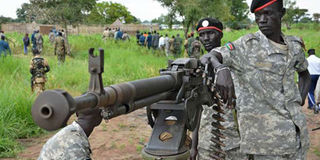South Sudan Bill limits foreign aid workers amid humanitarian crisis

South Sudanese SPLA soldiers are pictured in Pageri in Eastern Equatoria state on August 20, 2015. South Sudan lawmakers have passed a controversial Bill restricting numbers of foreign aid workers, sparking fears it will hinder efforts to help millions in need in the war-torn young nation. PHOTO | AFP
What you need to know:
- The Non-Governmental Organisations (NGO) bill, passed by parliament on Wednesday, means no more than a fifth of aid workers can be from abroad, a level many aid workers believe is simply not viable.
- Aid agencies already employ large numbers of South Sudanese -- often far higher than the 80 per cent level now required -- but not at senior levels or among technical specialists.
- Foreign agencies often provide the only source of healthcare for vast areas.
JUBA, SOUTH SUDAN
South Sudan lawmakers have passed a controversial Bill restricting numbers of foreign aid workers, sparking fears it will hinder efforts to help millions in need in the war-torn young nation.
The Non-Governmental Organisations (NGO) Bill, passed by parliament on Wednesday, means no more than a fifth of aid workers can be from abroad, a level many aid workers believe is simply not viable.
Aid agencies must "ensure that not less than 80 per cent of the employees are South Sudanese nationals at all managerial, middle and junior levels," the bill read, according to a copy seen by AFP Thursday. It must still be signed by the president to pass into law.
Aid workers contacted asked not to be named following the Bill.
They said there was also concern at a clause making the issuing of a "false statement" about the bill punishable by up to three years in prison, as well as a possible 50,000 South Sudan pound fine, over $2,000 at current rates.
Aid agencies already employ large numbers of South Sudanese -- often far higher than the 80 per cent level now required -- but not at senior levels or among technical specialists.
Civil war began in December 2013 when President Salva Kiir accused his former deputy Riek Machar of planning a coup, setting off a cycle of retaliatory killings that have split the poverty-stricken, landlocked country along ethnic lines.
Tens of thousands have died in two years of war, more than 2.3 million people have been driven from their homes and 3.9 million South Sudanese face severe food shortages.
East Africa's Igad bloc last week called on rival forces to allow food into conflict zones on the brink of famine, where aid workers have warned tens of thousands may be dying of starvation.
Foreign agencies often provide the only source of healthcare for vast areas.
Fighting continues despite an August peace deal, and the conflict now involves multiple militia forces who pay little heed to paper peace deals, driven by local agendas or revenge attacks.





